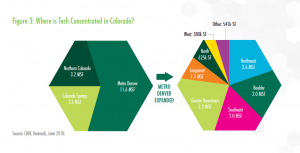DENVER – A new report by CBRE confirms that Colorado’s tech scene is expanding at a rapid rate. According to the report 22 technology companies opened new Colorado offices or moved their headquarters to the state in the past year and technology absorbed 849,000 square feet in incremental space across the state from Q3 2017 to Q2 2018—more than double the industry’s absorption over the preceding four quarters. Leading the region in leasing activity for several years, tech companies now occupy 17.3 million square feet across the Front Range.
“Colorado is witnessing tech industry expansion to a degree not yet seen this business cycle. The state’s tech talent pipeline continues to grow, fueled both by homegrown talent coming out of Colorado universities and in-migration of highly educated professionals from out of state who are attracted to the region’s job opportunities and live-work-play culture. Colorado’s tech sector is also nurtured by an entrepreneurial culture that is uniquely supportive, providing extensive resources to start-ups as they launch and mature,” said Katie Murtaugh, Senior Research Analyst with CBRE in Denver.
Tech companies in the software and search industries grew the most in incremental square footage, followed by cloud, business services and e-commerce firms.
 Submarkets across the Front Range continue to evolve and diversify in their concentration of tech industries and footprints:
Submarkets across the Front Range continue to evolve and diversify in their concentration of tech industries and footprints:
- Downtown Denver has the region’s fastest-growing tech presence; its share of office space dedicated to the tech sector jumped from 5.9 to 7.8 percent over the four quarters studied.
- Downtown Denver overtook Boulder for having the lowest average tech company age, indicating that more start-ups are turning to Denver for their launch locations.
- Boulder displaced the Northwest submarket for having the highest tech concentration; 33.4 percent of Boulder’s office space is now dedicated to tech firms.
- Northwest still reigns No. 1 for largest metro Denver tech footprint overall; it is home to nearly 2.6 million square feet of tech companies. The Northwest’s affordability attracts companies in need of larger footprints; the average tech office space in the Northwest is 49,400 sq. ft. (vs. 26,000 sq. ft. statewide).
- Metro Denver’s Southeast submarket is home to 2.0 million square feet of high-tech companies; software companies occupy the most space in the submarket (911,000 sq. ft.), followed by business services companies (767,000 sq. ft.).
- In Fort Collins, 88 percent of the tech footprint is in industrial and flex/R&D space due to the prevalence of hardware design and manufacturing firms. The area also has a budding start-up scene fueled by Innosphere’s high-tech incubator and Colorado State University, which is a leader in agricultural technology and clean tech.
- Traditionally characterized by large entities in advanced manufacturing of high-tech devices, Colorado Springs’ tech scene is diversifying with growth in the software, aerospace, data center and cybersecurity industries. The area’s outgoing military personnel, increasing millennial population and relative affordability contribute to its attractiveness to tech companies.
Tech Talent a Key Factor in Attracting Companies Between 2010 and 2017
Colorado’s tech sector employment grew 34.1 percent (or the equivalent of 27,429 new jobs). The majority of that employment growth occurred in the Denver/Boulder metro area, which for the first time ranked among North America’s Top 10 Tech Talent Markets in CBRE’s annual Scoring Tech Talent Report. Coming in at No. 10, the report cited the metro area’s tech talent job growth, wage growth and highly educated labor force as contributing factors to its rise on the international stage.
Companies taking note of the Front Range’s growing prominence in the tech industry include at least 22 firms who opened new locations or moved their headquarters to Colorado last year. This includes Netflix (opened a new Boulder office), Maxar Technologies (moved HQ to Westminster), Formstack (opened new office in Colorado Springs), Upserve (opened a new Denver office) and
Snapfulfil (opened a U.S. HQ in Broomfield).
“In addition to the extraordinary growth of the local tech scene, we are seeing larger, more established tech firms from both coasts relocate to, or open a new office, along the Front Range. It’s confirmation that these companies who stand at the top of their field see value in our State and want to gain a competitive advantage by tapping into the high-quality workforce that is choosing to live in Colorado,” said Alex Hammerstein, senior vice president with CBRE’s Tech and Media Practice.
Flexible Office Space
The report also found that flexible office providers—including coworking spaces, incubators and enterprise solutions—are becoming a compelling force in metro Denver’s office market. Currently flex office operators lease more than 2.0 million square feet in metro Denver, the sixth greatest concentration among North American markets, and they are looking to grow. CBRE tracked an additional 778,000 square feet in either signed leases or space being sought by flex office providers in metro Denver, a 38.2 percent increase over their current footprint.
“Agile workplace solutions like coworking are growing in popularity with companies across industries, but they are particularly attractive to tech companies due to the flexibility for growth they afford. It’s no surprise that areas experiencing impressive tech industry growth, like Colorado’s Front Range, are also seeing increased options in flex office space,” said Beth Moore, CBRE’s Agile Real Estate practice leader for the Americas.









